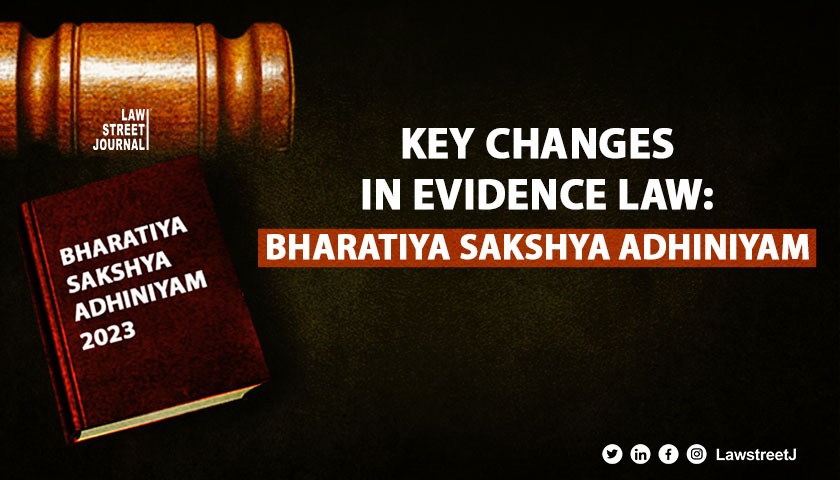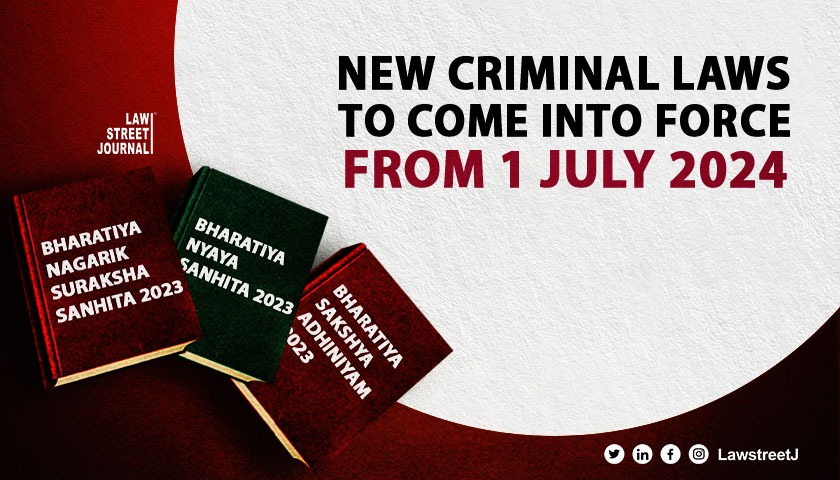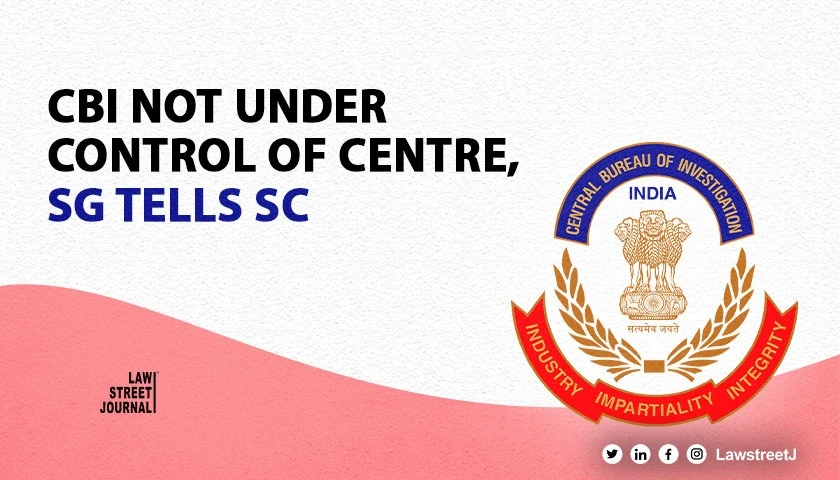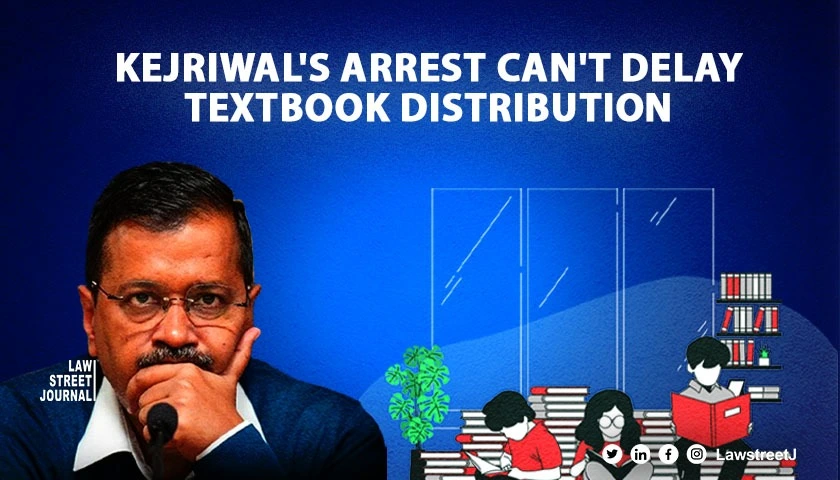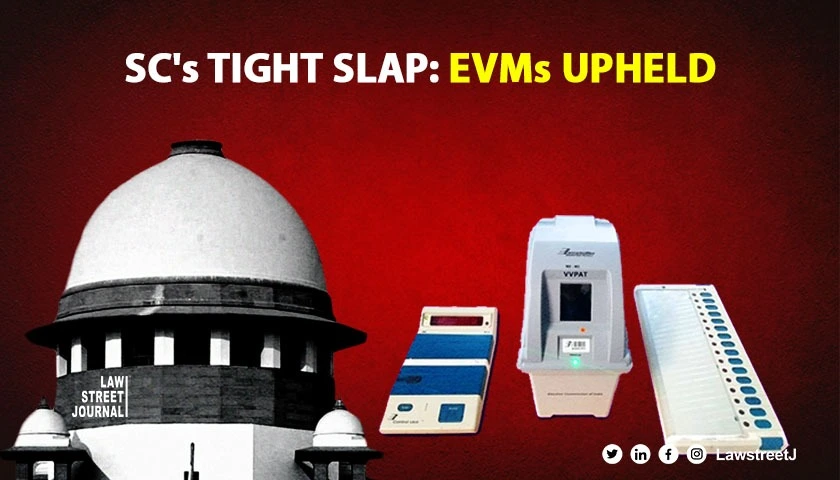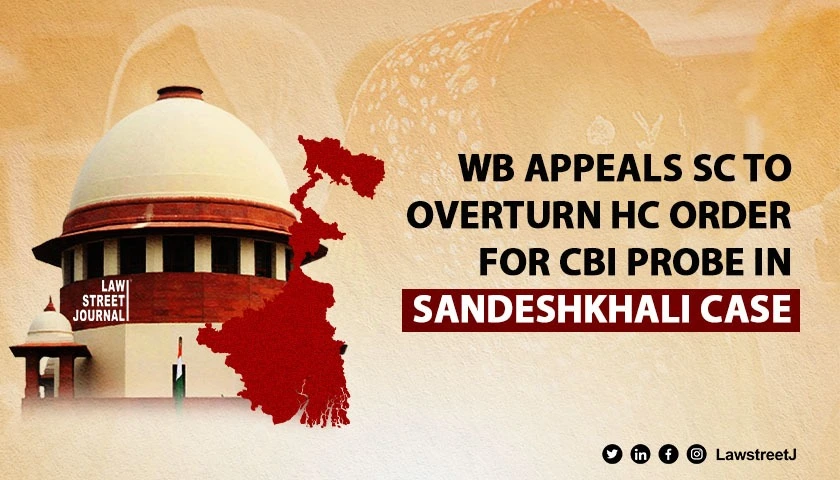NEW DELHI: Last year the Parliament revamped the Criminal laws - both substantive and procedural, by passing the three Bills. The Indian Penal Code, 1860 has been sought to be replaced by Bharatiya Nyaya Sanhita, 2023, whereas Bharatiya Nagarik Suraksha Sanhita Bill, 2023, to replace the Code of Criminal Procedure, 1973, and Bharatiya Sakshya Bill, 2023 to supersede the Indian Evidence Act, 1872.
Central Government has appointed the 1st day of July, 2024 as the date on which the provisions of the Bharatiya Nyaya Sanhita, 2023 (45 of 2023), the Bharatiya Nagarik Suraksha Sanhita, 2023 (46 of 2023) and the Bharatiya Sakshya Adhiniyam, 2023 (47 of 2023) shall come into force.
Need for Change:
The demand for revamping the criminal laws is not a recent phenomenon, rather the same has been reiterated time and again with calls from several quarters and stakeholders, commissions, and institutions alike. The Criminal Justice System has a myriad of problems -
- huge pendency of cases,
- inconsistencies, and inefficiencies in procedure pertaining to the arrest, bail, investigation, and trial;
- existence of several obsolete substantive provisions and lack of certain penal provisions;
- arbitrariness in police and prosecutorial actions, and
- lack of modernization in the law of evidence.
Out of a total pendency of 5.06 crore cases, the share of criminal cases is 3.5 crores. This pendency can be attributed to several factors including the lack of adequate number of judges, supporting staff and infrastructure, cooperation of stakeholders viz. bar, investigation agencies, witnesses and litigants.
According to the National Crime Records Bureau, a massive 77 percent of India’s prisoners in 2021 were undertrials. When countless individuals languish in jails for years together in the hope that Justice will be served to them one fine day, then the less said about the efficiency of the criminal justice system the better.
Another significant criticism of these laws was that these were colonial creations whose provisions had become obsolete, with a lack of provisions criminalising acts that ought to be penalised, and that even many of these provisions were not in line with our constitutional and social values.
Therefore, there was a crucial need to revamp, restructure and redesign the criminal law framework to be made applicable in India, and as such this required a mammoth exercise to bring in comprehensive reforms by rewriting the criminal laws to fulfil the needs of a modern and vibrant democracy, bringing in inclusiveness and efficiency while preserving the sanctity of due process and constitutional values, and to ensure the safety and security of the individual, the community and the nation.
Bharatiya Sakshya Adhiniyam
The present Indian Evidence Act, 1872 was drafted by Sir James Fitzjames Stephen. Its aim was to consolidate, define and amend the law of evidence. Whereas, the new law seeks to consolidate and provide general rules and principles of evidence for fair trial. The new law has 170 sections, divided into 12 Chapters and a Schedule for Certificate.
The Statement of Objects and Reasons of the Bill highlights that the Indian Evidence Act has been repealed because it fails to ‘address the technological advancement undergone in the country during the last few decades.’ The present law was not yet adept at the new technological advancements and ever-evolving avatars of electronic evidence.
The most significant changes in this Act pertain to consolidation of sections, bringing in uniformity and precision, and removal of references from the colonial era. If we take an overview of the new legislation - it can be said to have three dimensions:
- to decolonise the law,
- to humanise the law and
- to modernise the law.
Decolonisation
It is the foremost responsibility of the government and institutions of a country to instil self-respect. No nation can survive without the citizens having a sense of self-respect and I think it is important that your laws also instil that sense of self-respect.
Any self-esteemed society desires to remove the undo the subjugation meted out and to break free from the shackles of foreign tools of exploitation imported and imposed upon it. It was a mark of disgrace that despite 70 years of independence we were forced to carry on the legacy of and be governed by the archaic and colonial criminal justice system designed by the British.
Lets take for example, Section 69 of the Evidence Act which deals with proof where no attesting witness is found. The provision reads, “if no such attesting witness can be found or if the document purports to have been executed in the United Kingdom, it must be proved that the attestation of one attesting witness at least in his handwriting under the signature of the person executing the document is in the handwriting of that person”.
Let's take another section. Section 57 is a very important section of the Evidence Act. It deals with facts of which the court must take judicial notice. Sub-section (2) of Section 57 states that all public acts passed or hereafter to be passed by Parliament of the UK, Parliament of the United Kingdom and all local personal acts delegated by the Parliament of the United Kingdom to be judicially noticed. Sub-section (4), The course of proceedings of Parliament of the United Kingdom of the constituent assembly of India of Parliament and of the legislature and so on. Sub-section (5), “The accession and sign manual of the sovereign for the time being of the United Kingdom of Great Britain and Ireland”.
Let us see Section 78 of the Evidence Act, sub-section (3). Section 78 deals with proof of other official documents and Sub-section (3) provides - Proclamations, orders or regulations issued by her Majesty or by the privy council or by the department of her Majesty’s government.
All these references in the new law that are obsolete have been removed, including Commonwealth, Provincial Act, Her Majesty’s Government/Dominions, and references to Parliament of the UK, British Crown, London Gazette, etc.
Again, in Sections 21, 64, 132, 133, 152, 153 of BSA, the Legislature has replaced the words “barrister, attorney, pleader or vakil” with “advocate”.
Section 82 of the Evidence Act dealing with presumption about documents admissible in England, has now been excluded from the new Act. Similarly, Section 88 of the new Act modifies the scope of Section 86 of the Evidence Act which deals with presumption as to certified copies of foreign judicial records to exclude reference to dominions of Great Britain and adopts a nomenclature to indicate documents from any country beyond India.
Humanisation
What the new law does is that it clubs and arranges the sections in a better and ordered manner than what we had in the existing law. So, there is a better arrangement of sections.
Even as regards applicability of the law of evidence, as on date by virtue of Section 1 of the Evidence Act, the law did not apply to Court martials under the Army/Navy/Air Force Act, now this exception has been removed in the new law.
Under Section 8, Illustration (f) of the new Act, the word “man” has been replaced with “person” to make the provision gender-neutral.
Very importantly there were some of the provisions where the Act used the word “lunatic”. The Act changes the word “lunatic” that to “person with mental issues” and I think it is important because a person or witness may not be a lunatic, but his evidence may be tainted on account of a mental illness that he/she may be going through, and it is important for the law to reflect that. Even otherwise the stigma attached to the word “lunatic” would be diluted to a great extent.
Modernisation
Every other day due to advancements in technology, more and more digital and electronic evidence shall be the evidence that would be produced before the court. The law needs to update itself to be able to address them, to be able to ensure that the evidence becomes available to a court for the purposes of adjudication.
Institutions must advance to keep pace with the times. Now if the institutions and the laws do not keep peace with the time, they not only become irrelevant, but they also become tools to victimise. Now, the new law has a greater emphasis on including electronic and digital evidence.
As of today, the definition of a document did not contain electronic and digital records. The definition of Document under Section 2(1)(d) of the Bill has been expanded and includes electronic or digital records. It also includes e-mails, server logs, computers, smartphones, laptops, SMS, websites, locational evidence, mails, and messages on devices.
Likewise in the definition of ‘evidence’, under the existing Evidence Act only electronic records were treated as documentary evidence and there was no express mention of digital records in the definition of “evidence”. Under Section 2(1)(e) of the new Act, the provision expressly includes electronic or digital records as documentary evidence.
A new provision has been added in Section 2(2) of the new Act that any words and expressions used but not defined in the Act will have the meaning as given in the IT Act, Bharatiya Nyaya Sanhita and Bharatiya Nagrik Suraksha Sanhita.
Section 24 of the new Act that corresponds to Section 30 of Evidence Act has added a new explanation which provided that in cases of trial of more than one persons who is a proclaimed offender shall be deemed to be joint trial. Thus, it brings in the concept of joint trial in respect of somebody who is evading the course of justice.
The definition of word “expert” under Section 39 of the new Act has been broadened to make the opinion of experts in fields even other than foreign law, science or art as also relevant facts to help the Court form an opinion.
The new Act under Section 31 that corresponds to Section 37 of Evidence Act also makes electronic form of official gazette admissible evidence. Also, Law Books and Court’s rulings in electronic and digital format have also been made admissible under Section 32.
Chapter III of the Act, dealing with ‘facts which need not be proved’ includes an amended Section 52 which deals with facts of which judicial notice must be taken. Section 52(1)(a) (corresponding to Section 57(1) of the Evidence Act) includes within it all laws operating within the territory of India having extra territorial operation. Further, Section 52(1)(b) includes international treaties, agreements, and conventions with countries by India, apart from decisions made by India at international associations and other bodies. Notably, Section 52 excludes references to seals, proceedings, sovereign concerning the United Kingdom and limits the scope to similar authorities of India.
In Chapter V of the Act, under Section 57 pertaining to primary evidence (corresponding to Section 61 of the Evidence Act), new explanations have been added - Explanations 4, 5, 6 and 7:
- where electronic or digital records are recorded or stored, each file is a primary evidence;
- where electronic or digital record is produced from proper custody, such record is primary evidence unless disputed;
- where a video recording is stored in electronic form or transmitted, each of the stored recording is primary evidence; and finally
- where an electronic record is stored in multiple storage spaces in a computer resource, each such automated storage including temporary files is primary evidence.
Section 58 of the Act, concerning ‘secondary evidence’ (corresponding to Section 63 of the Evidence Act) has been amended and expanded to include additional categories such as oral admissions, written admissions and evidence of a person examining a document within the meaning of secondary evidence. Section 58 therefore has a broader scope as opposed to secondary evidence under the Evidence Act, as it now includes oral admissions, written admissions and evidence taken by a skilled person from an original document which cannot be examined by the court.
To apply and to qualify as secondary evidence however, the oral or written evidence must relate to the original and not a copy. Such additional categories of secondary evidence are expected to assist courts in determining admissibility of documents.
Section 61 of the Act (corresponding to Section 65B of the Evidence Act) simplifies the existing section and provides that admissibility of electronic or digital record shall have the same legal effect, validity and enforceability as paper records.
Section 65B of the old law requires preceding safeguards to be adopted for electronic evidence. In the new law, it has been evolved, in Section 63 of BSA and now there is also a schedule of certificate that must accompany the evidence from electronic records.
Section 85 of the BSA makes another important change which is a rebirth of Section 85A to add not just electronic signatures, but digital signatures. The point is that we had digital signatures missing despite the progress that we have made and everywhere from Company Directors and filings to Income Tax filings digital signatures have become the norm.
Further, Section 90 of the BSA sets out the presumption with respect to electronic messages, as opposed to telegraphic messages as specified in Section 88 of the Evidence Act.
Conclusion
Coming finally to the appraisal of these laws which are yet to be implemented, it is a matter of fact that Evidentiary loopholes are the pain of our trial system, whether it is criminal trial or civil trial. Matters continue for years after years on the basis of evidentiary loopholes. The questions of admissibility, relevance are the riddles that haunt the judicial system. The new legislation to an extent intends to ensure that we get a watertight evidentiary system.
One of the noteworthy provisions is Section 122 of Sakshya Act that corresponds to existing Section 116 of Evidence Act, which is something which persons who are dealing with rent control would be very familiar with. It says, “No tenant of immovable property or person claiming through such tenant shall during the continuance of the tenancy or any time thereafter be permitted to deny that the landlord had a title to such immovable property”. The existing law does not have the words “or any time thereafter”. So now the Parliament has introduced this to say that it's not just that during the continuance of the tenancy, you cannot dispute the ownership of the landlord, even after you left tenancy. This simple example shows the intent of the provision and so I think it is a well-conceived piece of legislation.
However, one significant fact that needs to be borne in mind while analysing the provisions of this Bill is that, unlike the two criminal codes, the law of evidence applies to criminal as well as civil law. Therefore, changes brought into the language of the Act also requires a rethink as to its repercussions on the Civil Procedure, and whether changes are required in the Civil Procedure Code? If yes, what changes?
There may be some pluses and minuses here and there, but the intent of the law is to see that cases proceed as fast as possible, and this is something which has to be desired in every judicial system.
I express my sincere belief that when the new laws come in force, they would usher in a new era of Criminal Justice with efficient machinery made for and by the people of Bharat, and that justice would become easily accessible, available, and acceptable to the people.
Aditya Kashyap is an advocate practising at the Supreme Court of India.
(Disclaimer: Opinions and views expressed are solely those of the author and do not necessarily reflect the views of LawStreet Journal.)
